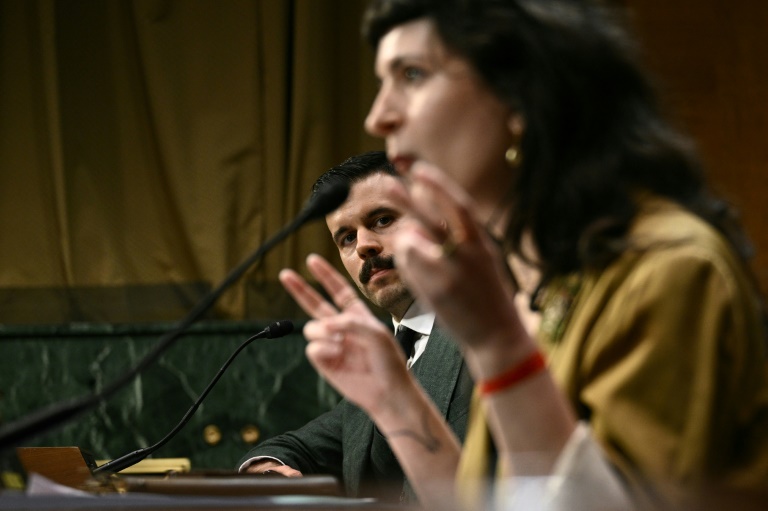Science
Meta Faces Allegations of Suppressing Child Safety Research

Meta, the parent company of Facebook and Instagram, has been accused of suppressing internal research that highlights significant child safety risks on its virtual reality platforms. These allegations came to light during a testimony before the U.S. Congress on Tuesday, where current and former employees detailed how the company allegedly obstructed sensitive safety studies.
According to six researchers, following heightened scrutiny from Congress in 2021, Meta employed legal teams to screen and edit internal research. The whistleblowers assert that this legal intervention aimed to create a facade of plausible deniability regarding the negative impacts of the company’s virtual reality products on young users. This information was first reported by the Washington Post.
During the Senate hearing, former Meta researcher Cayce Savage stated, “Meta is aware that its VR platform is full of underage children. Meta purposely turns a blind eye to this knowledge, despite it being obvious to anyone using their products.” Meta’s VR platforms, particularly the Quest 3, are significant in the industry despite being a financial burden for the company.
The allegations further suggest that after former product manager Frances Haugen leaked damaging information about Meta’s handling of content issues, the company revised its policies regarding research into sensitive topics such as children and harassment. Specifically, researchers were advised to avoid using terms like “illegal” or “violates” in their studies, thereby limiting the scope of their findings.
Internal documents reveal that employees had repeatedly raised concerns about children under 13 circumventing age restrictions to access Meta’s VR services, which are intended for users aged 13 and older. One employee estimated as early as 2017 that up to 90 percent of users in some virtual environments were underage, cautioning that such issues could lead to serious public backlash.
In response to these allegations, Meta has firmly denied any wrongdoing. Spokeswoman Dani Lever characterized the claims as a “predetermined and false narrative” that cherry-picks examples. She emphasized the company’s commitment to the safety of younger users, pointing out that various safety measures have been implemented.
During the hearing, researcher Jason Sattizahn expressed skepticism about Meta’s willingness to change its practices voluntarily. “It is very clear that Meta is incapable of change without being forced by Congress,” he remarked. Sattizahn criticized the company for prioritizing engagement and profits over ethical considerations, stating, “They have had unearned opportunities to correct their behavior, and they have not.”
As the debate continues, the implications of these allegations could have far-reaching effects on Meta’s reputation and operations, particularly as regulators and lawmakers scrutinize the tech giant’s handling of child safety in the rapidly evolving landscape of virtual reality.
-

 Education5 months ago
Education5 months agoBrandon University’s Failed $5 Million Project Sparks Oversight Review
-

 Science6 months ago
Science6 months agoMicrosoft Confirms U.S. Law Overrules Canadian Data Sovereignty
-

 Lifestyle5 months ago
Lifestyle5 months agoWinnipeg Celebrates Culinary Creativity During Le Burger Week 2025
-

 Health6 months ago
Health6 months agoMontreal’s Groupe Marcelle Leads Canadian Cosmetic Industry Growth
-

 Education5 months ago
Education5 months agoNew SĆIȺNEW̱ SṮEȽIṮḴEȽ Elementary Opens in Langford for 2025/2026 Year
-

 Science6 months ago
Science6 months agoTech Innovator Amandipp Singh Transforms Hiring for Disabled
-

 Technology6 months ago
Technology6 months agoDragon Ball: Sparking! Zero Launching on Switch and Switch 2 This November
-

 Business2 months ago
Business2 months agoEngineAI Unveils T800 Humanoid Robot, Setting New Industry Standards
-

 Technology3 weeks ago
Technology3 weeks agoDigg Relaunches as Founders Kevin Rose and Alexis Ohanian Join Forces
-

 Top Stories2 months ago
Top Stories2 months agoCanadiens Eye Elias Pettersson: What It Would Cost to Acquire Him
-

 Education6 months ago
Education6 months agoRed River College Launches New Programs to Address Industry Needs
-

 Business5 months ago
Business5 months agoRocket Lab Reports Strong Q2 2025 Revenue Growth and Future Plans
-

 Technology6 months ago
Technology6 months agoGoogle Pixel 10 Pro Fold Specs Unveiled Ahead of Launch
-

 Education6 months ago
Education6 months agoAlberta Teachers’ Strike: Potential Impacts on Students and Families
-

 Technology4 months ago
Technology4 months agoDiscord Faces Serious Security Breach Affecting Millions
-

 Business6 months ago
Business6 months agoBNA Brewing to Open New Bowling Alley in Downtown Penticton
-

 Science6 months ago
Science6 months agoChina’s Wukong Spacesuit Sets New Standard for AI in Space
-

 Lifestyle4 months ago
Lifestyle4 months agoCanadian Author Secures Funding to Write Book Without Financial Strain
-

 Business6 months ago
Business6 months agoNew Estimates Reveal ChatGPT-5 Energy Use Could Soar
-

 Business1 month ago
Business1 month agoNvidia and AMD CEOs Unveil AI Innovations at CES 2026
-

 Business4 months ago
Business4 months agoHydro-Québec Espionage Trial Exposes Internal Oversight Failures
-

 Business6 months ago
Business6 months agoDawson City Residents Rally Around Buy Canadian Movement
-

 Top Stories4 months ago
Top Stories4 months agoPatrik Laine Struggles to Make Impact for Canadiens Early Season
-

 Technology6 months ago
Technology6 months agoFuture Entertainment Launches DDoD with Gameplay Trailer Showcase










